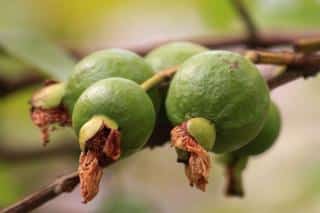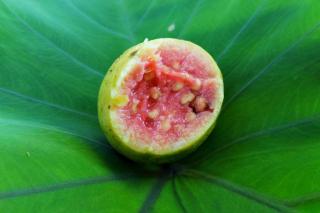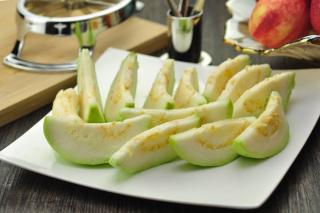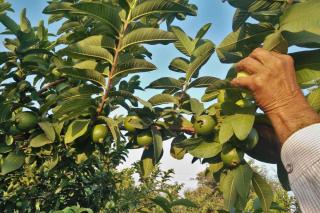

Guava is a fruit for which we appreciate the many great benefits for health.
The guava, or Psidium guajava, is the fruit of the guava tree. This plant that belongs to the Myrtaceae family can reach 10 to 20 feet (3 to 6 meters) tall. It can cope with both high and low temperatures. In Brazil, it’s nicknamed Feijoa. Guava is harvested in fall.
This tropical fruit grows in a roundish shape, and its skin is either green, orange or yellow. The color of the flesh differs too, and is either pink, white or yellow.
Especially in winter, one can find several guava varieties available for sale in stores, shaped like pears or apples.
Guava is a gold mine for our health. It bestows us with many health benefits both in the field of medicine and in cosmetology.
 Guava is native to South America (Brazil). The Aztecs had been cultivating it for over 2000 years. They nicknamed it the “sand plum”, which refers to the grains of sand that are encapsulated in the flesh.
Guava is native to South America (Brazil). The Aztecs had been cultivating it for over 2000 years. They nicknamed it the “sand plum”, which refers to the grains of sand that are encapsulated in the flesh.
It spread to the Antilles islands and to Tahiti.
For centuries, Africans have been using guava as part of their traditional medicinal practices.
Today, the main producers are China, India and South America and Martinique.
Guava is excellent for intestinal transit. Full of dietary fiber, it resolves diarrhea. Recommendation: chew guava leaves or seeds. Another option is to infuse guava leaves in 1 quart (1 liter) water and drink the preparation, after filtering it, during the day.
Guava tree leaves harbor analgesic properties. They decrease pain due to sore throat and dental pain. Directions for use: drink the guava tree leaf infusion, use as mouthwash, or chew the leaves.
 The leaves also boast antibacterial and anti-inflammatory activity. They thus speed wound-healing up and soothe all types of inflammation: bronchitis, pharyngitis, gum inflammation. Directions for use:
The leaves also boast antibacterial and anti-inflammatory activity. They thus speed wound-healing up and soothe all types of inflammation: bronchitis, pharyngitis, gum inflammation. Directions for use:
When part of a decoction, guava tree leaves are used for its astringent properties. Recommendation: Apply onto skin on the wounded areas.
They also reduce vomiting.
Guava contains a lot of antioxidants. Antioxidants block premature ageing of cells and skin and counter free radicals that are damaging to the body. Its antioxidants also reduce anarchic proliferation of cancerous cells. Vitamin C, another useful compound, stimulates our body’s defense system.
Guava is a diuretic. Effective in case of water retention.
Guava is anti-allergy. It blocks histamine production which would otherwise be triggered in the case of allergy.
Guava is also known to reduce arterial blood pressure. Consumption of guava in case of hypertension is recommended. It would thus reduce risks of cardio-vascular diseases. Moreover, it has been shown to lower bad cholesterol levels.
Diarrhea, digestive disorders, water retention, dental pain and headaches, inflammations, arterial hypertension.
Calorie intake of guava: 68 kcal / 3.5 oz (100 g).
Fats contained in guava: 0,6g / 3.5 oz (100 g).
 Guava can be eaten raw, juiced and in guava mousse. It’s also possible to cook it to produce excellent jam and sauce.
Guava can be eaten raw, juiced and in guava mousse. It’s also possible to cook it to produce excellent jam and sauce.
A very refreshing fruit, we like eating guava in smoothies, ice cream, or in fruit salads.
Its juice is very much appreciated in guava punch and other cocktails. Guava is delicious when paired with other fruits: raspberries, strawberries, mango and coconut. Pomegranate in particular shares its fruity flavor and blends well with guava.
It also flavors cakes and cheesecake quite well.
People who love sweet & sour tastes eat guava slices dipped in soy sauce or vinegar.
For a sweet dessert, guava jam is a perfect match to cottage cheese.
It fits right in to any diet that diabetic persons must follow because it doesn’t generate any glycemic peak in their system.
Guava provides many minerals and trace elements that are beneficial to proper body functions: magnesium, phosphorus, potassium, sodium, zinc, copper and manganese. It also contains B group vitamins and vitamin C.
Guava also presents benefits used in cosmetology.
 For hair especially, it reduces hair loss. Directions for use:
For hair especially, it reduces hair loss. Directions for use:
Guava is astringent, it restores your skin tone.
Guava cleaning lotion – boil the fruit and its leaves. Filter and keep the water in the refrigerator. To cleanse your skin, dunk a wad of cotton in your lotion.
In a decoction, guava soothes cutaneous rashes.
Natural guava scrub – blend one guava and one kiwi fruit. Add a spoonful of honey to the blend. Massage your body with this while showering.
Another tip: Slice a guava in to halves and rub them on clean skin with a circular motion. When finished, rinse.
Anti-acne and black spot guava treatment – mash guava leaves, and add water. Apply on face and rinse off.
On top of guava’s antibacterial properties, they also eliminate bacteria in the mouth, ensuring your breath stays fresher.
Storing and keeping guava – this very fragile fruit only keeps for 2 days in the refrigerator.
For your guava to ripen, let it stay at room temperature for a few days.
Very Informative article on health benefits of guava .